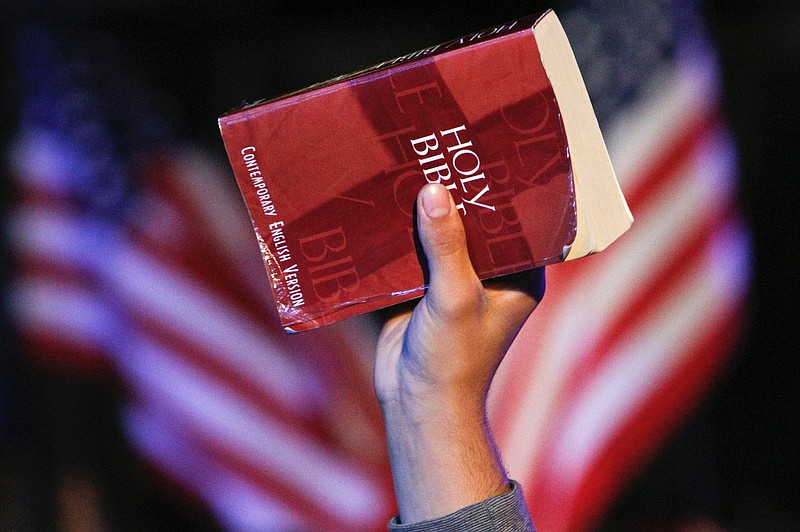Read more
Ramsey: Bill making the Bible the official book of Tennessee belittles sacred tomeLawmaker wants TN constitution to recognize God's absolute governance
Nearly two months ago, we noted that the Bible is the world's best-selling book and contains all of the necessary information needed for personal salvation, but said making it Tennessee's "official state book" was trivializing it to the maximum.
Nevertheless, it appears a bill doing just that will reach the state House and Senate floors next week and would have enough votes to pass. Who, after all, wants to be the candidate in a conservative, rural county in 2016 who voted against the Bible?
It's possible a ruling by Tennessee Attorney General Herbert Slatery III, finding that it violates the state constitutional mandate that "no preference shall ever be given, by law, to any religious establishment or mode of worship," will stop the bill in its tracks.
But, if the Bible is ensconced in the state's Blue Book -- its official government manual -- with the raccoon as the state wild animal and the tomato as the state fruit, it becomes little more there than an answer to a trivia question. Its selection is not likely to gather one more reader but could attract an unwanted lawsuit.
It deserves so much more than that, as the recently released 2015 State of the Bible by the American Bible Society and the Barna Group points out.
It's the first book 79 percent of Americans name when they think of sacred literature or holy books, the book 58 percent believe has had the most impact of any book on humanity, the book that 58 percent of Americans believe would make politicians more effective if they read it on a regular basis, and the book 49 percent of Americans believe contains everything a person needs to know to live a meaningful life.
A slight majority of Americans (51 percent) believe it has too little influence on society in the U.S. today, with more than 50 percent of Gen-Xers, boomers and the elderly maintaining that but only 33 percent of millennials saying so.
In choosing among five words to describe the Bible, more survey respondents (52 percent) selected "inspired" than "historical" (25 percent), "rulebook" (9 percent), "fictional" (8 percent) or "harmful" (2 percent).
Across the country, according to the report, 88 percent of households own at least one Bible. But the highest percentage of owners is not in the South (92 percent), as you might think, but in the Midwest (94 percent). Residents of the West (84 percent) and Northeast (78 percent) are less likely to have one in their homes.
Regionally, owners in the South (66 percent) are more likely to read their Bible as opposed to those in the Midwest (54 percent), West (43 percent) and Northeast (37 percent).
When they read it, according to the survey, the average reader spends about 30 minutes on it. And when they do, it's the King James version (39 percent), among all others, they usually open.
As to why they read it, given five responses, respondents chose "It brings me closer to God" (60 percent) over "I have a problem I need to solve or I need direction," "I need comfort," "I know I'm supposed to" or "It is part of my studies at school."
And as to the emotion they felt when reading it, people choose "peaceful" (41 percent) over "encouraged/inspired," "hopeful," "a sense of direction" and "happy."
The survey also asked if the values and morals of America are declining or not. Eighty percent -- up 3 percentage points since 2013 -- said "yes."
If Tennesseans believe that, they should follow the answers they gave on the survey -- taking to heart the book's effect on humanity, the fact that it has too little effect on society and that "It brings me closer to God" -- instead of placing it alongside the state amphibian and the state folk dance.
Reading the Bible, and then using it to act according to its precepts, is the best way for those in the state to testify to its historical and cultural importance -- and its effect on their lives.
Proposals to make the Bible the state book in Louisiana failed last year, and one in Mississippi failed earlier this year. This proposal deserves a similar failure.
However, the Bible's importance will live on.
